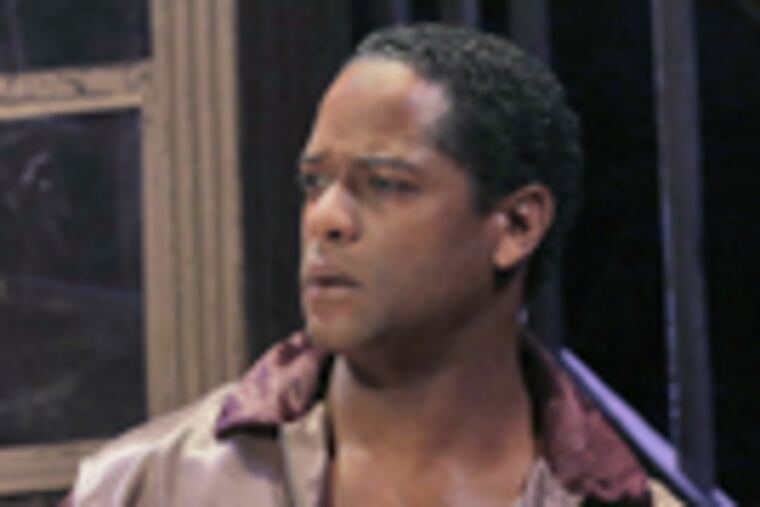Broadway review: ‘A Streetcar Named Desire’
Blanche DuBois isn’t the only hot gal in the new Broadway production of “A Streetcar Named Desire” that opened Sunday night. Her sister, Stella, is also full-steam ahead in a production that makes sense of the attraction between Stella and her husband, the explosive Stanley, by giving them the bond of passion for one another. And Stanley? Pretty hot, too. Temperatures are rising all around at the Broadhurst Theatre, where Tennessee Williams’ 1947 play, which won the Pulitzer Prize and is a great American classic with iconic characters, is being given a superb revival with a mostly African-American cast. The tale of Blanche — a trashy Southern woman who has lost the family estate and lives in delusions of grandeur — is fluid and powerful in the staging by Emily Mann, the artistic director of Princeton’s McCarter Theatre.

Blanche DuBois isn't the only hot gal in the new Broadway production of "A Streetcar Named Desire" that opened Sunday night. Her sister, Stella, is also full-steam ahead in a production that makes sense of the attraction between Stella and her husband, the explosive Stanley, by giving them the bond of passion for one another. And Stanley? Pretty hot, too.
Temperatures are rising all around at the Broadhurst Theatre, where Tennessee Williams' 1947 play, which won the Pulitzer Prize and is a great American classic with iconic characters, is being given a superb revival with a mostly African-American cast. The tale of Blanche — a trashy Southern woman who has lost the family estate and lives in delusions of grandeur — is fluid and powerful in the staging by Emily Mann, the artistic director of Princeton's McCarter Theatre.
The production is aptly garish when night falls and Stella and Stanley's dumpy flat (an evocative set by Eugene Lee) is lit by the harsh purples and reds of New Orleans' French Quarter (Edward Pierce's lighting design). There, a down-and-out Blanche has come, unannounced, to hole up with her Stella and her husband, a man she's never met and who sees right through her.
Under Mann's direction, noisy offstage trolleys clang and rumble by on an erratic schedule (Mark Bennett's sound), the air seems always very still, and the temperature duly enflames raw nerves. But life also goes on apace. Forget the dreary stagings of "Streetcar," with intense interpretations at every turn. This one has both life and heart, not just mind; it's as funny as it is violent and loud.
And its cast brings "Streetcar" off with such style, the play seems naturally written for a black family in the French Quarter of 1952, where blacks and whites mingled easily in a city that often left its isolated black population in other neighborhoods feeling little at home. (This is not the first production of "Streetcar" in which the major characters are African American.)
Nicole Ari Parker (Showtime's "Soul Food," film's "Boogie Nights") plumbs Blanche for her talent in putting on airs and her undercurrent of constant desperation. Tall, lanky, with an easygoing sexuality and the eyes of a tigress, Parker's Blanche is quick to note every irony but the one she's created for herself as an elite woman with a street-class life.
Blair Underwood, from TV's "The Event," "In Treatment," and many others shows, is a nuanced Stanley — the Polish last name Kowalsi is dropped, along with references to his background. Underwood, with eyes that glare menacingly one minute and charm playfully the next, and a smile and golden voice that could kill in any case, is a real-life Stanley; you can see how his physicality would attract Stella and how it could also, in his worse moments, rebuff him.
Daphne Rubin-Vega ("Anna in the Tropics" and the originator of Mimi in "Rent") is Stella, and she locks into the place where her character is caught between loving her husband and but hating him for his treatment of Blanche. Wood Harris ("The Wire") is Mitch, the buddy of Stanley with an eye for Blanche. Six supporting players round out the cast and there's not a misfire in them.
Emily Mann knew Tennessee Williams, and at the end of his life the playwright and director had a real bond. She was not depending on the company of strangers when she took on "Streetcar," and her insights in this version make that clear.
Contact Howard Shapiro at 215-854-5727 orhshapiro@phillynews.com, or #philastage on Twitter. Read his recent work at go.philly.com/howardshapiro. Hear his reviews at the Classical Network, www.wwfm.org.
"A Streetcar Named Desire" is at the Broadhurst Theatre, 235 West 44th St., New York.